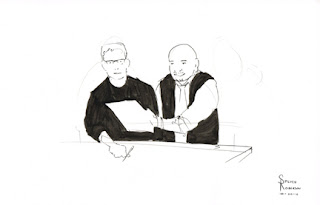While the students were responding to the prompts I posted last week, I was setting up my station inside the auditorium. I was going to be drawing under an
Elmo projector, which would be displayed on a big screen to the audience, along with other powerpoint presentations and word collecting applications. It was a huge multimedia breakfast extravaganza. I was drawing directly with ink, which meant there was no room for fixing mistakes. Needless to say, this was a rather new experience for me, so I spent a little time warming up as students entered.
This is about the time when you are
asking yourself, "Can I do this?"
The Moment of Truth
Before I knew it, the event was off and running! Curtis was engaging the students as I tried to record the essence of what was said. It all went by in a blur because I was focusing on capturing as much information as possible. I was working so quickly that I forgot they had given me a microphone. Suddenly, Curtis turned the mic over to me and they asked me to offer a recap of what we had already talked about. Miraculously, I was able to recall everything that had happened. The drawings helped bring all of the conversations back fresh into my head, and I successfully caught everyone up to speed.
At this point, I was already getting worried. There
Were errors in the picture that I couldn't fix and
didn't have time to fix.
This time, I tried to draw more lightly with a different pencil,
but one of the staff came up and informed me nobody could
see what I was drawing. That meant I couldn't
spend time planning the drawings either.
About halfway through the event, I started to realize my drawing strategy was completely wrong. I had been trying to make pretty drawings instead of trying to record the thoughts expressed. Once I grasped this and started using a more shorthand drawing style, the images instantly became twice as lively.
I once heard Sergio Aragones say that
drawing in front of people is not about drawing
well, it's about drawing fast...he was right!
These drawings are definitely not the most beautiful
of my career, but they hold a functional charm that
has grown on me.
At first, I thought I did a really
bad job because the drawings weren't
what I expected to do.
However, I received only positive feedback
from students and faculty after the event.
In hindsight, I realized that the later drawings allowed
me to capture more information and take a more
graphic approach, which proved very
useful for the final product.
Thinking back to the event, I realized that I was faced with a huge, split-second decision that had a lot to do with how I wanted people to view me. I resisted drawing in my shorthand because I thought it wasn't good enough, but the opposite proved true. The moment I stopped trying to win people's approval was the moment everything started to work.
Moral of the story:
If you want to be humbled,
draw in front of a crowd.
Caveat:
This will not work if you excel
at drawing in front of crowds.
One side of me still wants to hide these in an old box so that nobody will see them, but they are a vital part of this story. Hiding them just wouldn't do it justice. So that is a look at the Studio Culture Event from my perspective. It was a thrilling opportunity that was way outside of my comfort zone, but I actually would like to try it again some day! If you want to get a firsthand look, Professor Arpad Ronaszegi took some very nice photos of the event. Please visit his
blog to see things from his viewpoint!
Next week, I will unveil the final product of this entire process!














